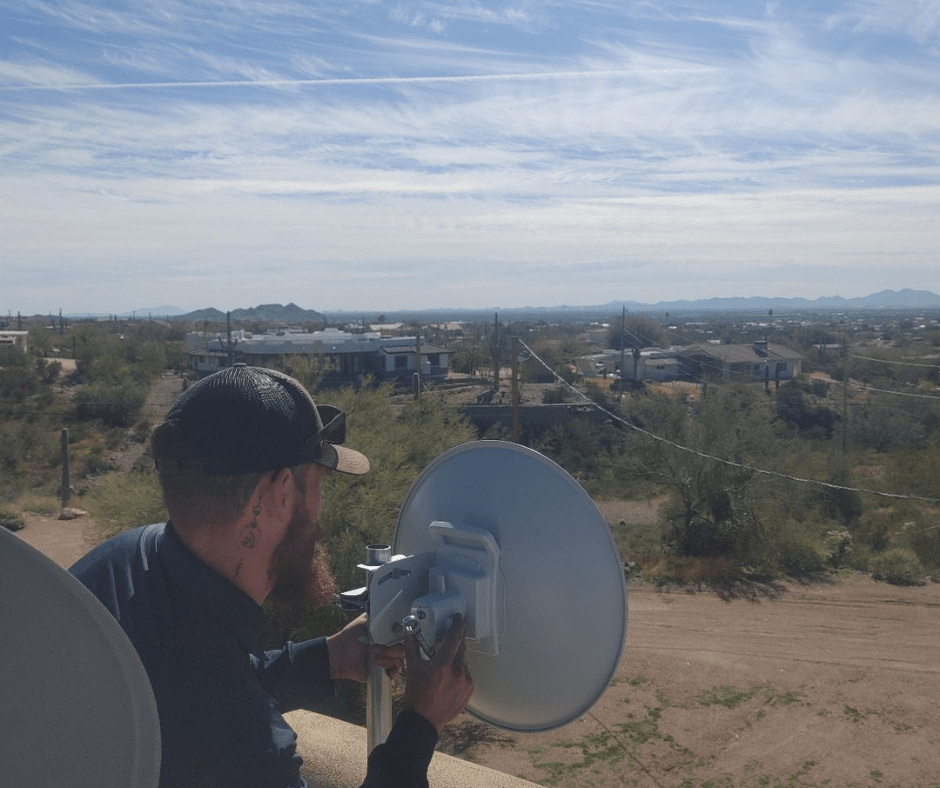From Wittmann to Apache Junction, the vast expanses of rural Phoenix have the most beautiful desert terrain. Gone are the city lights and towering skyscrapers, yet these rural areas still yearn to stay connected online. With limiting options, the more rural you get, many wonder how to live in the modern era while still enjoying the rural landscapes.
Many cable companies refuse to run lines or dig trenches to service these low-density areas, but there is good news. Phoenix Internet has the ability most cable companies do not. The technology that sets Phoenix Internet apart is called fixed-point wireless internet.
Cable companies find the logistics difficult to translate into a profitable margin for rural customers. The challenges include laying down infrastructure, high investments in fiber optics, and time-consuming preparations. As a result, many rural communities have little to no option for internet service.
Does Satellite Internet Work?
For rural residents, one solution that some have explored is satellite internet. This route offers coverage in even the absolute most remote areas of the desert. It makes this offer tempting for residents who have never had access to the internet. However, satellite internet has its own set of challenges that include latency issues and data caps.
Latency, or the delay in transmitting data between the satellite dish and the ground station, can greatly impact your online streaming, gaming, and video conferencing. This alone makes satellite internet less than ideal for most rural residents. In addition, most satellite internet plans will cap your data. This means that you will be limited in the amount of data you can use. Lastly, satellite internet tends to be more expensive than traditional cable internet.
What is Fixed Point Wireless Internet?
An alternative to traditional cable and satellite internet is a system called fixed point wireless internet. This is a very popular alternative for rural residents. This technology works by transmitting internet signals from a fixed base station to receiver’s in your home or business. This differs from satellite as the point of internet is fixed, while the satellite is in orbit above the earth. This means that fixed point wireless internet will have lower latency issues and more consistent speeds. Fixed point wireless internet is an attractive offer for residents who need to work, stream or game from home.
A key advantage of fixed point wireless technology is its versatility in the desert rural landscape. As mentioned above, traditional cable companies must dig trenches to lay cables and have an extensive infrastructure to be successful. This is extremely costly, time consuming and can be even more challenging in the rural terrain. On the other hand, a fixed-point wireless system uses a tower that can be assembled much more quickly and be cost-effective. It is by far the more practical solution for rural residents of Phoenix.
How is Fixed-Point Wireless Internet Installed?
So how does a company like Phoenix Internet install a fixed-point wireless system? This process usually begins with the installation of a base station. This is the central hub where transmission of internet signals happens. Phoenix Internet will strategically place these base stations to provide optimal coverage in a specific area. The signals then transmit to receivers in your home. The receivers are provided by Phoenix Internet. They can be mounted on rooftops or poles to capture the signal from the base station. This is perfect for both customers and businesses alike.

Is DSL Good for Rural Areas?
If you live in rural Phoenix, you might be wondering if DSL is a good option. DSL (Digital Subscriber Line) is yet another type of internet connection. It has a history of being used by rural residents by using existing telephone lines. These lines deliver internet, thus making it more readily available in areas where the infrastructure of the phone lines is already in place.
The biggest drawback to DSL is the speed of the internet. Customers are limited by the distance between their home and the nearest telephone exchange. This results in slow speeds for those farthest from the exchange.
Final Thoughts on The Impact of Fixed Point Wireless Technology on Rural Phoenix Residents
While rural residents seem to have more internet connection options than ever before, they still have a very limited pool of choices. If traditional cable lines cannot reach your home, you must choose between DSL, satellite, or fixed-point wireless. DSL and satellite are incredibly problematic if you need a strong, smooth, and uninterrupted connection at all times. Fixed-point wireless can handle rural terrain, is cost-effective, and delivers great speeds more reliably than the other options. In Phoenix, fixed-point wireless internet is the top technology for the internet. The local commitment to bridge the gap in reliable rural internet is found nowhere else in the valley.

